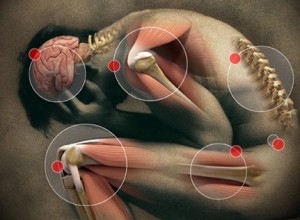FMS (fibromyalgia syndrome) is a widespread musculoskeletal pain and fatigue disorder for which the cause is still unknown. Fibromyalgia means pain in the muscles, ligaments, and tendons - the soft fibrous tissues in the body.
Most patients with FMS say that they ache all over. Their muscles may feel like they have been pulled or overworked. Sometimes the muscles twitch and at other times they burn. More women than men are afflicted with FMS, and it shows up in people of all ages.
To help your family and friends relate to your condition, have them think back to the last time they had a bad flu. Every muscle in their body shouted out in pain. In addition, they felt devoid of energy as though someone had unplugged their power supply. While the severity of symptoms fluctuate from person to person, FMS may resemble a post-viral state. This similarity is the reason experts in the field of FMS and chronic fatigue syndrome (CFS) believe that these two syndromes may be one and the same. Gulf War syndrome also overlaps with FMS/CFS.
Symptoms And Associated Syndromes
Pain - The pain of FMS has no boundaries. People describe the pain as deep muscular aching, throbbing, shooting, and stabbing. Quite often, the pain and stiffness are worse in the morning and you may hurt more in muscle groups that are used repetitively.
Fatigue - This symptom can be mild in some patients and yet incapacitating in others. The fatigue has been described as "brain fatigue" in which patients feel totally drained of energy.
Sleep disorder - Most FMS patients have an associated sleep disorder called the alpha-EEG anomaly. Patients appeared to spend the night with one foot in sleep and the other one out of it.
Irritable Bowel Syndrome - Constipation, diarrhea, frequent abdominal pain, abdominal gas, and nausea represent symptoms frequently found in roughly 40 to 70% of FMS patients.
Chronic headaches - Recurrent migraine or tension-type headaches are seen in about 50% of FMS patients and can pose a major problem in coping for this patient group.
Temporomandibular Joint Dysfunction Syndrome - This syndrome, sometimes referred to as TMJ or TMD, causes tremendous jaw-related face and head pain in one quarter of FMS patients. Typically, the problems are related to the muscles and ligaments surrounding the jaw joint and not necessarily the joint itself.
Other common symptoms - Premenstrual syndrome and painful periods, chest pain, morning stiffness, cognitive or memory impairment, numbness and tingling sensations, muscle twitching, irritable bladder, the feeling of swollen extremities, skin sensitivities, dry eyes and mouth, dizziness, and impaired coordination can occur. Patients are often sensitive to odors, loud noises, bright lights, and sometimes even the medications that they are prescribed.
Aggravating factors - Changes in weather, cold or drafty environments, infections, allergies, hormonal fluctuations (premenstrual and menopausal states), stress, depression, anxiety and over-exertion may all contribute to symptom flare-ups.
Possible Causes
The cause of FMS remains elusive, but there are many triggering events thought to precipitate its onset. A few examples would be an infection (viral or bacterial), an automobile accident or the development of another disorder, such as rheumatoid arthritis, lupus, or hypothyroidism. These triggering events probably don't cause FMS, but rather, they may awaken an underlying physiological abnormality that is already present.
What Is The Prognosis?
Long term follow-up studies on FMS have shown that it is chronic, but the symptoms may wax and wane. The impact that FMS has on daily living activities, including the ability to work a full-time job, differs among patients. Overall, studies show that FMS may be equally as disabling as rheumatoid arthritis.
How Is It Diagnosed?
Currently there are no laboratory tests available for diagnosing Fibromyalgia. Doctors must rely on patient histories, self-reported symptoms, a physical examination and an accurate manual tender point examination. Proper implementation of the exam determines the presence of multiple tender points at characteristic locations.
Hope for fibromyalgia.
Over the past several years I have had the opportunity to help several patients with fibromyalgia. It has been my experience that there is not one cause for this condition so individualizing a patient's treatment program is essential. The immune system appears to be the most common weakness with the patients that I have worked with. Through the use of diagnostic testing like Vega testing we have been able to unravel the underlying cause and develop a treatment program on an individual basis. Not all patients respond as quickly to therapy because not all patients have the same underlying cause. From detoxification to specialized nutrients to rebalance the immune system as well as treating individual nutritional deficiencies, patients have responded extremely well to care. Though not all patients show a complete recovery, many do. Our program consists of developing an individual diet that matches a patients genetic makeup, targeting therapy to balance the immune system through chiropractic adjustments and specialized nutritional formulas. Enhancing a patients neurotransmitters with nutritional products that help enhance sleep and educating patients on the importance of following the five laws of natural health (see our pamphlets on the natural laws of health).











